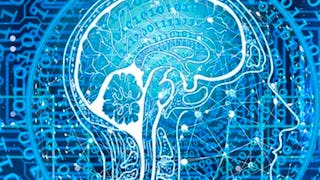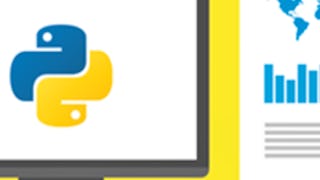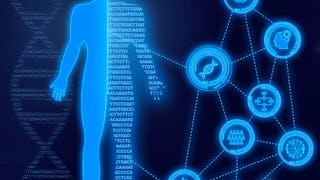Filter by
SubjectRequired
LanguageRequired
The language used throughout the course, in both instruction and assessments.
Learning ProductRequired
LevelRequired
DurationRequired
SkillsRequired
SubtitlesRequired
EducatorRequired
Explore the Nutritional Science Course Catalog
 Status: Free Trial
Status: Free TrialUniversity of California San Diego
Skills you'll gain: Clinical Trials, Pharmaceuticals, Clinical Research, Commercialization, Pharmacotherapy, Pharmacology, Regulatory Affairs, Intellectual Property, Portfolio Management, Bioinformatics, New Product Development, Medical Science and Research, Strategic Partnership, Product Marketing, Go To Market Strategy, Health Care Procedure and Regulation, Business Strategy, Marketing Strategies, Market Dynamics, Molecular Biology
 Status: Free Trial
Status: Free TrialUniversity of California, Irvine
Skills you'll gain: Data Ethics, Predictive Modeling, Unsupervised Learning, Natural Language Processing, Predictive Analytics, Data Analysis, Classification And Regression Tree (CART), Regression Analysis, Data Mining, Statistical Analysis, Data Science, Social Media, Text Mining, Anomaly Detection, Business Analytics, Decision Tree Learning, Statistical Modeling, Big Data, Analytics, Cloud Computing
 Status: Free Trial
Status: Free TrialSkills you'll gain: Exploratory Data Analysis, Feature Engineering, Unsupervised Learning, Supervised Learning, Regression Analysis, Dimensionality Reduction, Statistical Inference, Predictive Modeling, Data Processing, Data Access, Anomaly Detection, Machine Learning, Machine Learning Algorithms, Classification And Regression Tree (CART), Scikit Learn (Machine Learning Library), Statistical Analysis, Data Analysis, Statistical Modeling, Applied Machine Learning, Data Cleansing
 Status: Free Trial
Status: Free TrialSkills you'll gain: Data Visualization Software, Plotly, Data Visualization, Dashboard, Interactive Data Visualization, Matplotlib, Seaborn, Data Presentation, Data Analysis, Geospatial Information and Technology, Pandas (Python Package), Scatter Plots, Histogram, Heat Maps, Box Plots

The University of Edinburgh
Skills you'll gain: Precision Medicine, Bioinformatics, Image Analysis, Medical Imaging, Big Data, Health Informatics, Statistical Methods, Data Science, Machine Learning, Natural Language Processing, Probability & Statistics, Data Analysis, Molecular Biology, Network Analysis, Graph Theory, Healthcare Ethics

University of Maryland, College Park
Skills you'll gain: Cyber Risk, Cyber Security Policies, Security Management, Cybersecurity, Risk Management, Cyber Security Strategy, Cyber Attacks, Cyber Governance, Infrastructure Security, Telecommunications, Computer Security Awareness Training, Threat Detection, Enterprise Security, Security Awareness, General Networking, Data Security, Vulnerability, Public Safety and National Security, Governance, Political Sciences
 Status: Free Trial
Status: Free TrialUniversity of Washington
Skills you'll gain: Regression Analysis, Applied Machine Learning, Feature Engineering, Machine Learning, Image Analysis, Unsupervised Learning, Artificial Intelligence and Machine Learning (AI/ML), Predictive Modeling, Classification And Regression Tree (CART), Supervised Learning, Bayesian Statistics, Statistical Modeling, Artificial Intelligence, Deep Learning, Data Mining, Computer Vision, Statistical Machine Learning, Predictive Analytics, Text Mining, Machine Learning Algorithms
 Status: Free TrialStatus: AI skills
Status: Free TrialStatus: AI skillsSkills you'll gain: Data Storytelling, Business Metrics, Key Performance Indicators (KPIs), Marketing Analytics, Bayesian Statistics, Descriptive Statistics, Marketing Effectiveness, Statistical Hypothesis Testing, Target Audience, Marketing Strategies, Data Cleansing, Pandas (Python Package), Data Modeling, Data Analysis, Data Visualization Software, Spreadsheet Software, A/B Testing, Data Collection, Marketing, Interviewing Skills

Stanford University
Skills you'll gain: Cryptography, Data Encryption Standard, Encryption, Key Management, Advanced Encryption Standard (AES), Public Key Cryptography Standards (PKCS), Cybersecurity, Authentications, Data Integrity, Secure Coding, Algorithms
 Status: Free Trial
Status: Free TrialSkills you'll gain: Incident Response, Stakeholder Communications, Cyber Threat Intelligence, Cybersecurity, Incident Management, Security Awareness, Data Ethics, Security Information and Event Management (SIEM), Stakeholder Engagement, Data Security, Asset Protection, Information Privacy, Communication, Artificial Intelligence, Professional Networking

The University of Sydney
Skills you'll gain: Mental Health, Stress Management, Community Mental Health Services, Mindfulness, Mental Health Diseases and Disorders, Psychiatry, Positivity, Rehabilitation, Resilience, Behavioral Health, Clinical Psychology, Mental Health Therapies, Psychotherapy, Personal Development, Mental and Behavioral Health, Creativity, Self-Awareness, Occupational Therapy, Empowerment, Physical Therapy
 Status: Free Trial
Status: Free TrialUniversity of Toronto
Skills you'll gain: Computer Vision, Image Analysis, Control Systems, Embedded Software, Automation, Deep Learning, Software Architecture, Computer Graphics, Simulations, Safety Assurance, Artificial Neural Networks, Global Positioning Systems, Visualization (Computer Graphics), Hardware Architecture, Estimation, Algorithms, Machine Learning Methods, Predictive Modeling, Scenario Testing, Spatial Data Analysis
Nutritional Science learners also search
In summary, here are 10 of our most popular nutritional science courses
- Drug Development Product Management: University of California San Diego
- Data Science Fundamentals: University of California, Irvine
- IBM Introduction to Machine Learning: IBM
- Data Visualization with Python: IBM
- Data Science in Stratified Healthcare and Precision Medicine: The University of Edinburgh
- Cybersecurity for Everyone: University of Maryland, College Park
- Machine Learning: University of Washington
- Meta Marketing Analytics: Meta
- Cryptography I: Stanford University
- Put It to Work: Prepare for Cybersecurity Jobs: Google










